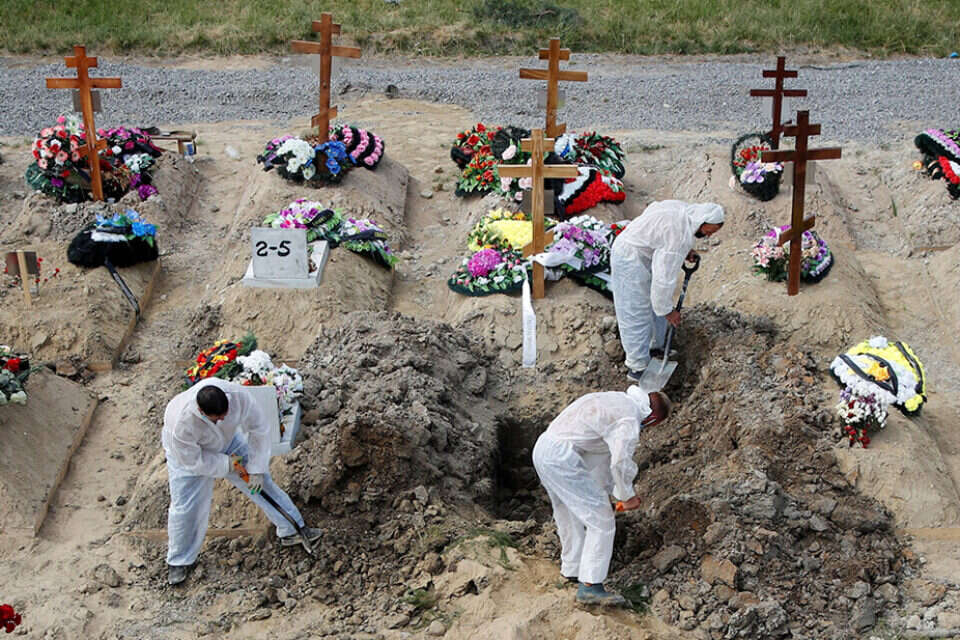While countries in the west of the continent have gradually removed the restrictions and returned to more or less normal life, in the east the delta wave is still not close to crashing into the coast of immunity.
On the contrary, in some places it is even still rising.
Note the data:
in Romania, an average of 430 people died every week in the last week (adjusted for the size of the population - 22.44 people per million inhabitants); In Ukraine about 655 daily (15.07 inhabitants per million people), in Bulgaria about 154 (22.57 per million), and in Moldova about 44 people (10.97 per million). On the date on which the above data were collected, in Denmark, which has already lifted all sanctions, an average of 4 people died daily in the last week (0.61 per million), in Norway 3 (0.57 per million), in Spain an average of 19 deaths per day. 0.42 per million) and in Italy 42 cases (0.69 per million).
So what's going on in the east of the continent? Some local reasons. In Romania, for example, much criticism has been leveled at the lax government - both at the demand to defend itself and at the response to the widespread phenomenon of corona denial, which includes influential bishops in the national Orthodox Church. Bulgaria also has a widespread phenomenon of corona denial, with 23% of residents saying they would not be willing to get vaccinated (compared to the EU average of 9%).
Pablo Fedorchenko-Kotoev, a sociologist from Kiev, accused the Ukrainian government of rushing to support immunization - but did not take care to provide enough vaccine doses. "As a result, citizens began to wonder if the virus was really as dangerous as the government claims," he told Euronews. Preserved even after the collapse of the USSR. Common to all Eastern European countries is a fairly low vaccination rate. While the EU average is a little over 65%, in Romania it is a little about 32%, in Bulgaria about 22%, in Moldova about 21%, and in Ukraine in general about 17% but above all the case of Russia stands out. , Which on the one hand matches the general picture of the eastern continent, and on the other hand requires special reference because it is the only country where it has developed its own vaccines ("Sputnik" is the most famous of all, but there are also CoviVac and EpiVacCorona). Despite this salient advantage,Just over 32% of Russia's population is vaccinated - or better said, they have a vaccination certificate. Because recently the TV channel Dozed published an investigation, according to which at least a third (!) Of the certificates are forged. In the mortality data segment, the picture is particularly catastrophic.
Adjusting for the size of the population, the average daily death toll last week was 7-8 people per million - but because of Russia's population size it is about 1,100 (!) People who die every day.
And this is only according to official statistics: independent demographers in Russia believe that mortality is two to three times higher.
A few days ago, the "Financial Times" published an estimate of leading Russian demographers, according to which there were 753,000 excess deaths in Russia.
Two weeks ago, Russia entered a week of closure - or as it was called "days without work", but it is doubtful if anyone believes that these measures will save the day.
What is happening in Russia and how it resonates throughout the former socialist bloc we sought to find out with anthropologist Alexandra Archipova from Moscow.
Dr.
Has the struggle in Corona reached a dead end?
"You see," laughs Dr. Archipova, "the phrase 'the struggle has come to a dead end' assumes there was a struggle. We have a wonderful paradox here: the 'Sputnik' is great, studies show it too. And yet, the propaganda has resoundingly failed. There are several reasons for this. The first is how the country behaves. This is what anthropologist Gregory Bateson called a double bind: a situation in which the government sends conflicting messages to its citizens. First, in February 2020 all the executives broadcast business as usual: in Russia there is no Corona and there will not be. Then all of a sudden it got very bad: everything closed, Sobyanin (Moscow Mayor, D.B.) used the language of war and called on the civilians to report for the war in the corona. Then the corona was reported to have been defeated.
Then she appeared again - and was defeated again. And the interesting thing is that the defeats that the corona inflicts are completely in line with the political schedule - a referendum on changes to the constitution, parliamentary elections, etc. We believe more. " But that is far from the whole story. For Dvir Archipova, even the measures taken by the authorities were not stable and very partial. "There is the Italian model of a full closure, there is the Swedish one where everything is open, but at least there was trust in the government. We chose a flashing model: there is a closure - but not really; we will close the pensioners in the houses - 'And in part not. All this means that these measures are taken late, and their selectivity sterilizes them from their effectiveness. To defeat the corona, one had to take many measures and a long time, and of course support businesses, but the government is not ready for that.
"And finally, the third aspect is the fact that the government does not want to say unpleasant things to human beings. It is a legacy of the Soviet language. The president and others do not say 'the situation is very bad, people are dying, they are closing in.' No, they say the situation is 'near critical' - And this is the most poignant understatement used, and then announce "days without work". What is 'days without work' for a person in Russia? Holidays and holidays. So here, announce 'days without work' - "By purchasing tickets to Sochi and other resort towns. It is clear that there will be no reduction in morbidity."
Another reason is the lack of medical information.
"We do not have public figures like Dr. Pauchi in the United States who could explain in an accessible and clear way. We are dealing with two doctors from health programs on television. If you follow what they broadcast, you can not miss that they are constantly giving conflicting information. For them, the corona has been defeated - and not defeated, not to mention that they transmit quasi-medical information such as eating persimmon to prevent corona. "How many were vaccinated in each district, how many side effects were recorded, etc. So when you are undecided, you start asking why there is no information."
And if the country can not be trusted, people are starting to look for alternatives.
"There is a social law, that the weaker the trust in the institutions of government, the stronger the horizontal ties. The weakest ties are people around us - colleagues, friends, the doctor we know. We will turn to these ties in times of distress."
According to Archipova, part of the story is Soviet heritage.
"There is a popular perception that the Soviet person is a collectivist. In practice, the post-Soviet person lives by the principle of 'what do I care.' "We hardly understand a situation where we have to give up our comfort for the benefit of those around us, because the Soviet Union demanded exactly the same thing from us, and coercively."
That is, what is missing in Russia and the post-Soviet space is developed citizenship.
"Exactly. Relations between the people of Russia and the government are built like this: they live there for their enjoyment, they steal, but it does not concern us. We lead a separate life. We are separate - the country separately, while the story of the corona violates this convention."
According to Archipova, political identification also affects responsiveness to the struggle in Corona.
"Studies show that those who do not like Putin and do not support him, refuse to get vaccinated."
That is, if the rate of vaccination against the corona is currently officially at 35%, is this the level of trust in the president?
"No, 60% -50% of us are not ready to be vaccinated. Of these, a high percentage of those who do not support Putin. There are other reasons - fear of chip implants, desire to wait."
Are there also intergenerational differences?
"Surveys show that seniors who believe in Putin are actually more vaccinated. But these are surveys. We now have a special project during which we have already conducted more than 70 two-hour interviews with teenagers, all over Russia. We clearly see that children are actually supporters of immunization, But they point to their parents as the opponents. They complain that the parents are afraid of the vaccine. I have a child from a village in the province of Stavropol (in southern Russia, D.B.) who wants to become a doctor. We asked why. Because he saw what was happening during the corona and how his parents were afraid of vaccines. He understood that he wanted to be a doctor. "
"People also have difficulty replacing the popular medical knowledge they received at a young age. The grandmothers taught us to drink hot tea if we catch a cold or keep our feet warm, and this information is very difficult to change. In this respect, the person's adaptability is very weak. For some home, immigrants from the USSR start looking for slippers. Or come back from the street and wash your hands. But there are lots of cultures where it does not exist. These habits are well internalized and very difficult to change. So any new information about the Corona barely passes this 'safety cushion'. For young people the information is processed more easily, for their parents - no. As they were taught - they will swim, so I think seniors get vaccinated well not because they love Putin but because they remember the mandatory vaccines in the Soviet Union well, so they act accordingly. " "M, refusing to vaccinate children was also a form of dissent, that is, opposition to the regime.
The cucumber method
One of the biggest problems associated with the Russian-speaking space is the rumors and pikes, which cause increased anxiety and fatally impair the willingness to get vaccinated.
Outside Russia, including in Israel, live tens of millions of people whose mother tongue is Russian or a spoken language.
Archipova and her team went deep into this tangle of fabrications and anxieties, creating a database of 301 plots and 11 million reps.
Some of the fabrications are spectacular in the degree of their folly, such as preventing corona by eating pickles, or warning against vaccines because the vaccinated can be identified using glandular devices.
"My favorite pike?", Archipova smiles.
They put this gene on the vaccine so that the vaccinated would rebel against God.
"Thus will a generation of people without the divine gene appear, and then the Antichrist will come faster."
If you mentioned Israel - here too rumors were circulating from the Russian-speaking space. But is there also the opposite effect? Israel has led for a long time in the level of immunization.
"Yes, there was a lot of that, especially after you started the massive immunization. But at the same time, rumors and rumors started circulating about Israel. The communication channels between Russia and Israel are very active and antisemitic allegations have surfaced. Around Ginzburg (Dr. Alexander Ginzburg, head of the institute that developed the "Sputnik"), according to which he wrote secret instructions to Jews not to get vaccinated, and that the vaccine was intended to exterminate the Russian people.
There are such antisemitic rumors in Russia, but they are not popular.
What is common is the rumor that Israel has a secret drug: lemon with soda, which must be drunk in certain doses to maintain acidic balance and thus kill the virus.
In fact, these stories of increasing acid balance came to us from China and Taiwan, where they spread in January-February 2020. Then they crystallized into texts through Google Translate, raided various countries, including Russia, but very quickly were dressed in the format of unnamed Israeli doctors, or given "An Israeli doctor from Odessa, Dr. Yudin." Israeli-Odessa doctors constantly recommend drinking the magic medicine, and with this advice justify the low mortality rate by everyone drinking lemon with soda. "
Is there a way to persuade people to change their minds?
"If citizens do not understand what the vaccine is, medical information needs to be improved. And sometimes people like to spread stories to feel unique. There are experiments that have shown that people who wanted to stand out in something - but were unable to, became good storytellers and continued to spread even when they were warned. The reasons vary, so we need to understand what the motive is and act accordingly. "












